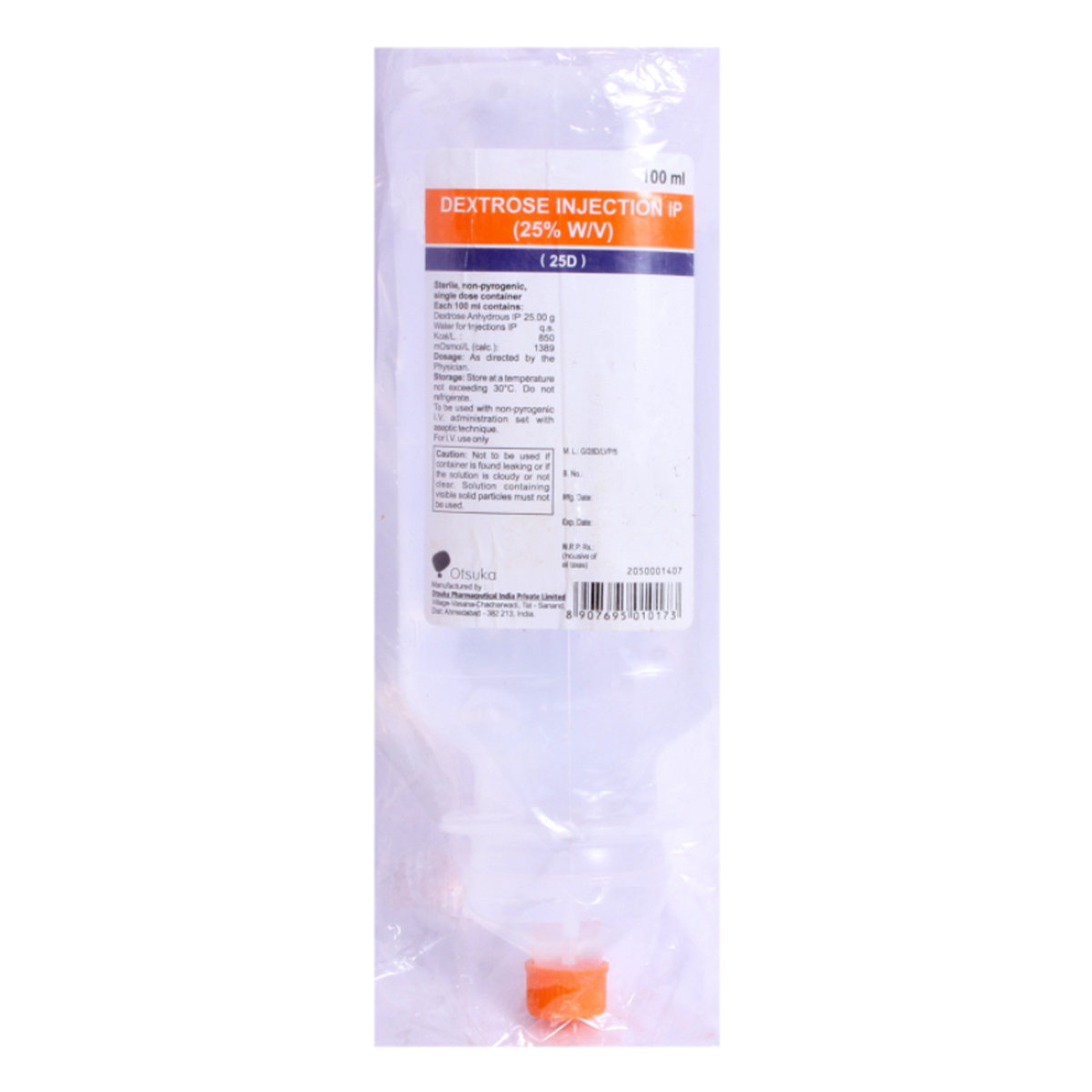Otsuka Dextrose Injection 100 ml
MRP ₹19.5
(Inclusive of all Taxes)
₹2.9 Cashback (15%)
Provide Delivery Location
Online payment accepted
 Prescription drug
Prescription drugWhats That
Composition :
Manufacturer/Marketer :
Consume Type :
Expires on or after :
Return Policy :
About Otsuka Dextrose Injection
Otsuka Dextrose Injection belongs to a class of drugs called glucose-elevating agents used for fluid replacement and dehydration. Also, Otsuka Dextrose Injection may be used to treat severe hypoglycaemia (very low blood sugar) in diabetic patients. It is indicated as a source of water and calories. A sufficient amount of fluids, electrolytes and minerals are necessary for the normal functioning of the body.
Otsuka Dextrose Injection contains Dextrose, a simple sugar that helps in replacing the fluids and carbohydrates in the body. Thereby, it helps in treating and preventing dehydration. Also, Otsuka Dextrose Injection works by quickly increasing blood sugar levels and helps to treat very low blood sugar in diabetic patients.
Otsuka Dextrose Injection will be administered by a healthcare professional; do not self-administer. In some cases, you may experience tenderness or pain at the injection site and flushing (redness, warmth or tingling sensation). Most of these side effects of Otsuka Dextrose Injection do not require medical attention and gradually resolve over time. However, if the side effects persist or worsen, please consult your doctor.
If you are allergic to Otsuka Dextrose Injection or any other medicines, please tell your doctor. If you have diabetes, inform your doctor before taking Otsuka Dextrose Injection . If you are pregnant or breastfeeding, please consult a doctor before taking Otsuka Dextrose Injection . Otsuka Dextrose Injection should be used with caution in elderly patients due to the increased risk of adverse effects. Inform your doctor about all the medicines, including vitamins, over-the-counter medicines and herbal products.
Uses of Otsuka Dextrose Injection
Directions for Use
Key Benefits
Otsuka Dextrose Injection contains Dextrose, a simple sugar that helps in replacing the fluids and carbohydrates in the body. Thereby, it helps in treating and preventing dehydration. Also, Otsuka Dextrose Injection works by quickly increasing blood sugar levels and helps to treat very low blood sugar in diabetic patients. Otsuka Dextrose Injection is used when a patient is unable to drink enough liquids or when extra fluids are needed.
Storage
Drug Warnings
If you are allergic to Otsuka Dextrose Injection or any other medicines, please tell your doctor. If you have diabetes, inform your doctor before taking Otsuka Dextrose Injection . If you are pregnant or breastfeeding, please consult a doctor before taking Otsuka Dextrose Injection . Otsuka Dextrose Injection should be used with caution in elderly patients due to the increased risk of adverse effects. Inform your doctor about all the medicines, including vitamins, over-the-counter medicines and herbal products.
Diet & Lifestyle Advise
- Regularly drink fluids to prevent dehydration.
- If you are unable to drink large volumes of fluids, try drinking small sips frequently.
- Consume foods rich in water content such as watermelon, cucumber, tomatoes, broccoli, spinach, oranges, Brussel sprouts, apples, etc.
Side Effects of Otsuka Dextrose Injection
- Tenderness or pain at the injection site
- Flushing (redness, warmth or tingling sensation)
Habit Forming
Therapeutic Class
All Substitutes & Brand Comparisons
RX
Claris Dextrose Injection 500 ml
Claris Lifesciences Ltd
₹39.5
(₹0.07/ 1ml)
61% CHEAPERRX
Out of Stock25 D Infusion
Claris Lifesciences Ltd
₹15.93
(₹0.14/ 1ml)
22% CHEAPERRX
Nirlife Dextrose 25% Infusion 100 ml
Nirlife Healthcare
₹21
(₹0.19/ 1ml)
5% COSTLIER
Author Details
We provide you with authentic, trustworthy and relevant information
FAQs
Special Advise
It is not recommended to administer Otsuka Dextrose Injection simultaneously with blood products as it might cause hemolysis (rupture of red blood cells) or pseudo agglutination (misleading appearance of clumping of red blood cells).
Disease/Condition Glossary
Dehydration: Dehydration is the loss of body fluids more than what you take in. It could occur due to inadequate fluid intake, illness, sweating, excess urination, diarrhoea, or vomiting. A sufficient amount of fluids, electrolytes and minerals are necessary for the normal functioning of the body.
Severe hypoglycaemia: It is defined as low blood glucose levels which require assistance from other people to treat. It is an emergency condition that requires immediate medical attention and occurs in diabetic people taking insulin and other anti-diabetic medicines. The symptoms include loss of consciousness, fits, confusion or intense nightmares while asleep. The risk of severe hypoglycaemia in diabetic patients increases if the regular meal is delayed or missed, insulin overdose, alcohol intake or exercise is done without proper reduction in medication.

Have a query?
Alcohol
Safe if prescribed
The interaction of alcohol with Otsuka Dextrose Injection is unknown. Please consult a doctor before consuming alcohol while using Otsuka Dextrose Injection .
Pregnancy
Consult your doctor
Otsuka Dextrose Injection is a category C pregnancy drug and is given to pregnant women only if doctor thinks benefits outweigh risks. Please consult a doctor if you are pregnant.
Breast Feeding
Consult your doctor
Please consult a doctor if you are breastfeeding. Otsuka Dextrose Injection is given to a breastfeeding mother only if doctor thinks benefits are greater than risks.
Driving
Safe if prescribed
Drive only if you are alert after taking Otsuka Dextrose Injection .
Liver
Consult your doctor
Take Otsuka Dextrose Injection with caution, especially if you have a history of Liver diseases/conditions. The dose may be adjusted by your doctor as required.
Kidney
Consult your doctor
Take Otsuka Dextrose Injection with caution, especially if you have a history of Kidney diseases/conditions. The dose may be adjusted by your doctor as required.
Children
Safe if prescribed
Otsuka Dextrose Injection is given to children only if prescribed by a doctor.










